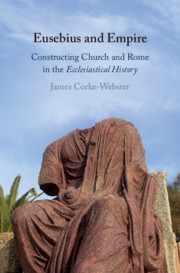Book contents
Chapter 3 - Christian Intellectuals
from Part II
Published online by Cambridge University Press: 04 January 2019
Summary
- Type
- Chapter
- Information
- Eusebius and EmpireConstructing Church and Rome in the <I>Ecclesiastical History</I>, pp. 89 - 120Publisher: Cambridge University PressPrint publication year: 2019

